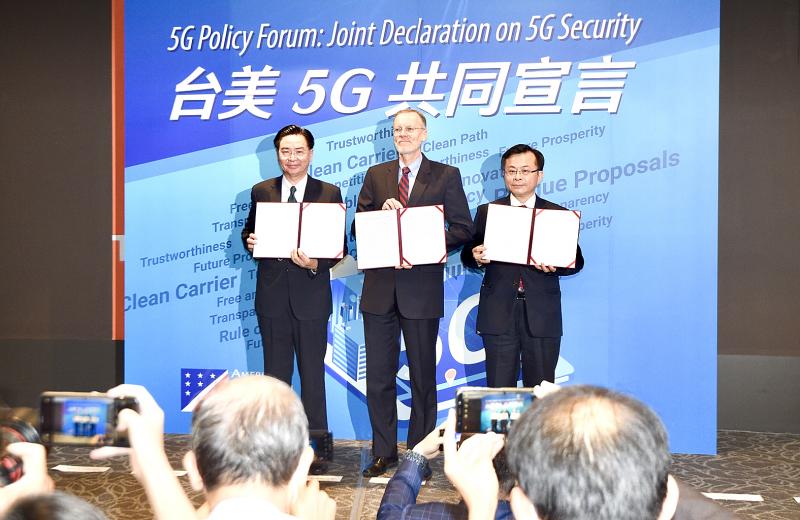The US is working with Taiwan to restructure global supply chains under the shared values of transparency and accountability, American Institute in Taiwan (AIT) Director Brent Christensen said, according to a transcript released by AIT yesterday.
Christensen made the remarks on Tuesday at the International Investment Forum in Taipei hosted by the Mergers and Acquisitions and Private Equity Council of Taiwan.
The COVID-19 pandemic has exposed the risks of over-reliance on one country or supplier for critical materials, such as medical supplies and pharmaceuticals, and for industries that are of strategic importance to shared economies, Christensen said.

Photo: Peter Lo, Taipei Times
Washington aims to diversify and bring supply chains closer to end users, and ensure that countries like China do not hold supply chains hostage for political purposes, he said.
The US works with like-minded partners, including Taiwan, Japan and the EU, to develop new supply chains based on shared values, he added.
Taiwan Semiconductor Manufacturing Co’s (TSMC, 台積電) plans to boost investment in the US send “an unmistakable signal that the future of high-tech supply chains remains in the US-Taiwan nexus,” Christensen said.
Highlighting the importance of accountability, transparency, reciprocity, respect for the rule of law and human rights, he said: “We would call these American values. We would also call them Taiwan values.”
At another forum in Taipei yesterday, the AIT and the Taipei Economic and Cultural Representative Office in the US issued a joint declaration on 5G security, echoing the Prague Proposals.
The Prague Proposals resulted from a 5G security conference hosted by the Czech Republic in May last year, and attended by officials and experts from more than 30 countries.
The US’ 5G Clean Path, announced by US Secretary of State Mike Pompeo in April, is an end-to-end communication that does not use any transmission, control, computing, or storage equipment from extremely problematic, untrusted IT vendors, such as Huawei Technologies Co (華為) and ZTE Corp (中興), Christensen said at yesterday’s forum.
The joint statement said that 5G suppliers should provide products and services that enable fair competition and downstream development by the maximum number of market participants.
It listed four criteria for evaluating 5G suppliers: Network hardware and software suppliers should not be subject, without independent judicial review, to control by a foreign government; suppliers should be financed openly and transparently; they should have transparent ownership, partnerships and corporate governance structures; and they should exemplify a commitment to innovation and respect for intellectual property rights.
Taiwan, on the front line of cyberdefense, has pre-emptively excluded hardware and software with cybersecurity risks, Minister of Foreign Affairs Joseph Wu (吳釗燮) said.
All of Taiwan’s 5G suppliers — Chunghwa Telecom Co (中華電信), Taiwan Mobile Co (台灣大哥大), Far EasTone Telecommunications Co (遠傳電信), Asia Pacific Telecom Co (亞太電信) and Taiwan Star Telecom Co (台灣之星) — are listed in the US’ Clean Path, showing that Taiwan is a trustworthy partner, he said.
The joint declaration signals that Taiwan-US cooperation in protecting cybersecurity has become institutionalized, Wu said, adding that Taiwan would continue to work with the US and other like-minded countries to develop 5G network standards.

A magnitude 5.6 earthquake struck off the coast of Yilan County at 12:37pm today, with clear shaking felt across much of northern Taiwan. There were no immediate reports of damage. The epicenter of the quake was 16.9km east-southeast of Yilan County Hall offshore at a depth of 66.8km, Central Weather Administration (CWA) data showed. The maximum intensity registered at a 4 in Yilan County’s Nanao Township (南澳) on Taiwan’s seven-tier scale. Other parts of Yilan, as well as certain areas of Hualien County, Taipei, New Taipei City, Taoyuan, Hsinchu County, Taichung and Miaoli County, recorded intensities of 3. Residents of Yilan County and Taipei received

Taiwan has secured another breakthrough in fruit exports, with jujubes, dragon fruit and lychees approved for shipment to the EU, the Ministry of Agriculture said yesterday. The Animal and Plant Health Inspection Agency on Thursday received formal notification of the approval from the EU, the ministry said, adding that the decision was expected to expand Taiwanese fruit producers’ access to high-end European markets. Taiwan exported 126 tonnes of lychees last year, valued at US$1.48 million, with Japan accounting for 102 tonnes. Other export destinations included New Zealand, Hong Kong, the US and Australia, ministry data showed. Jujube exports totaled 103 tonnes, valued at

TRUST: The KMT said it respected the US’ timing and considerations, and hoped it would continue to honor its commitments to helping Taiwan bolster its defenses and deterrence US President Donald Trump is delaying a multibillion-dollar arms sale to Taiwan to ensure his visit to Beijing is successful, a New York Times report said. The weapons sales package has stalled in the US Department of State, the report said, citing US officials it did not identify. The White House has told agencies not to push forward ahead of Trump’s meeting with Chinese President Xi Jinping (習近平), it said. The two last month held a phone call to discuss trade and geopolitical flashpoints ahead of the summit. Xi raised the Taiwan issue and urged the US to handle arms sales to

BIG SPENDERS: Foreign investors bought the most Taiwan equities since 2005, signaling confidence that an AI boom would continue to benefit chipmakers Taiwan Semiconductor Manufacturing Co’s (TSMC, 台積電) market capitalization swelled to US$2 trillion for the first time following a 4.25 percent rally in its American depositary receipts (ADR) overnight, putting the world’s biggest contract chipmaker sixth on the list of the world’s biggest companies by market capitalization, just behind Amazon.com Inc. The site CompaniesMarketcap.com ranked TSMC ahead of Saudi Aramco and Meta Platforms Inc. The Taiwanese company’s ADRs on Tuesday surged to US$385.75 on the New York Stock Exchange, as strong demand for artificial intelligence (AI) applications led to chip supply constraints and boost revenue growth to record-breaking levels. Each TSMC ADR represents